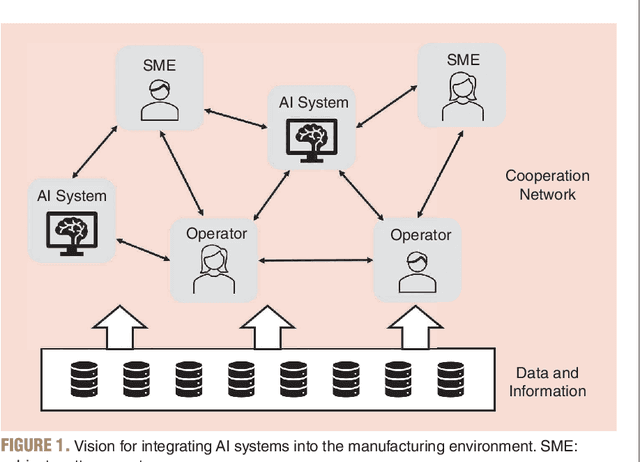James Moyne
Opportunities and Challenges to Integrate Artificial Intelligence into Manufacturing Systems: Thoughts from a Panel Discussion
Mar 20, 2023
Abstract:Rapid advances in artificial intelligence (AI) have the potential to significantly increase the productivity, quality, and profitability in future manufacturing systems. Traditional mass-production will give way to personalized production, with each item made to order, at the low cost and high-quality consumers have come to expect. Manufacturing systems will have the intelligence to be resilient to multiple disruptions, from small-scale machine breakdowns, to large-scale natural disasters. Products will be made with higher precision and lower variability. While gains have been made towards the development of these factories of the future, many challenges remain to fully realize this vision. To consider the challenges and opportunities associated with this topic, a panel of experts from Industry, Academia, and Government was invited to participate in an active discussion at the 2022 Modeling, Estimation and Control Conference (MECC) held in Jersey City, New Jersey from October 3- 5, 2022. The panel discussion focused on the challenges and opportunities to more fully integrate AI into manufacturing systems. Three overarching themes emerged from the panel discussion. First, to be successful, AI will need to work seamlessly, and in an integrated manner with humans (and vice versa). Second, significant gaps in the infrastructure needed to enable the full potential of AI into the manufacturing ecosystem, including sufficient data availability, storage, and analysis, must be addressed. And finally, improved coordination between universities, industry, and government agencies can facilitate greater opportunities to push the field forward. This article briefly summarizes these three themes, and concludes with a discussion of promising directions.
Merging Subject Matter Expertise and Deep Convolutional Neural Network for State-Based Online Machine-Part Interaction Classification
Dec 08, 2021



Abstract:Machine-part interaction classification is a key capability required by Cyber-Physical Systems (CPS), a pivotal enabler of Smart Manufacturing (SM). While previous relevant studies on the subject have primarily focused on time series classification, change point detection is equally important because it provides temporal information on changes in behavior of the machine. In this work, we address point detection and time series classification for machine-part interactions with a deep Convolutional Neural Network (CNN) based framework. The CNN in this framework utilizes a two-stage encoder-classifier structure for efficient feature representation and convenient deployment customization for CPS. Though data-driven, the design and optimization of the framework are Subject Matter Expertise (SME) guided. An SME defined Finite State Machine (FSM) is incorporated into the framework to prohibit intermittent misclassifications. In the case study, we implement the framework to perform machine-part interaction classification on a milling machine, and the performance is evaluated using a testing dataset and deployment simulations. The implementation achieved an average F1-Score of 0.946 across classes on the testing dataset and an average delay of 0.24 seconds on the deployment simulations.
 Add to Chrome
Add to Chrome Add to Firefox
Add to Firefox Add to Edge
Add to Edge